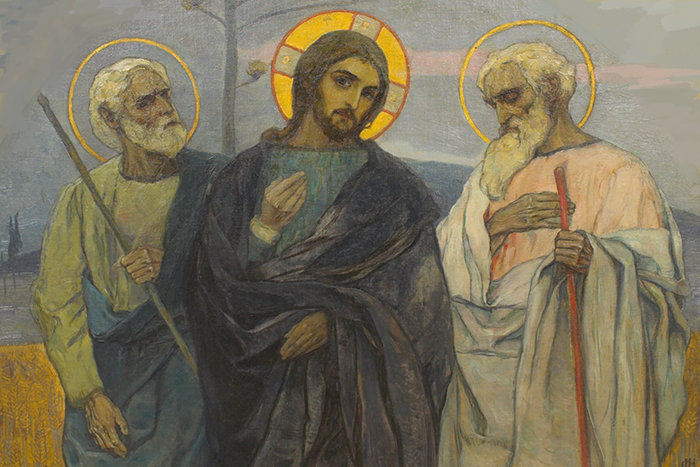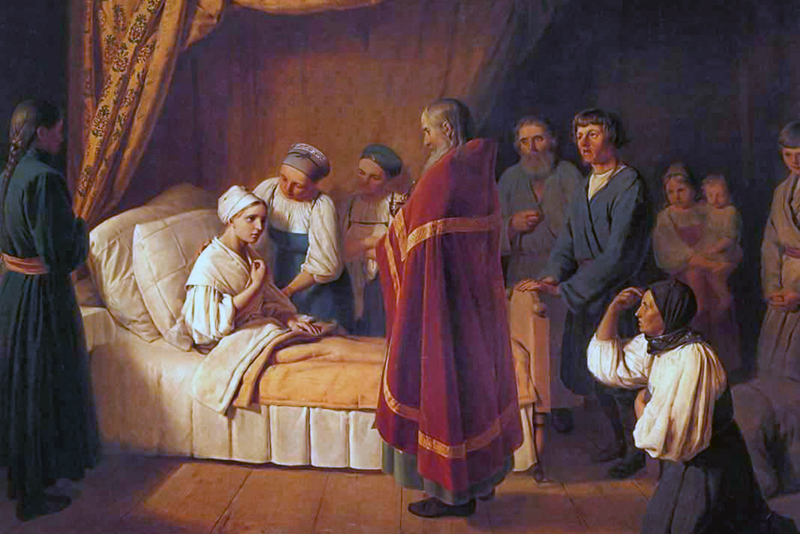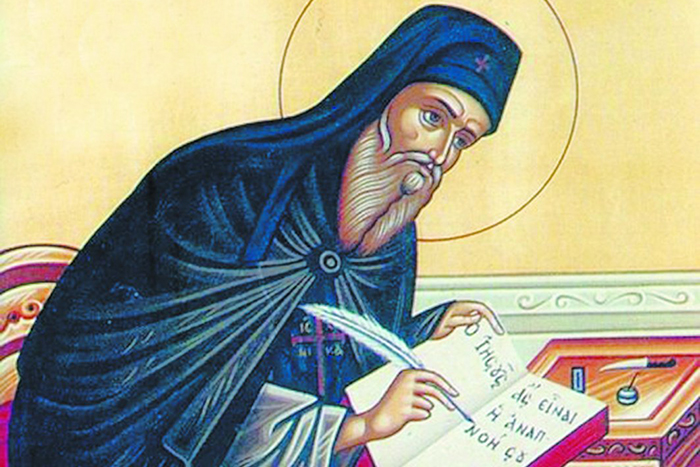
When we think about the saints, we very often imagine their lives to be an unceasing movement from earth to heaven, a continual going from strength to strength, that ignited one day and never went out. And even when we are talking about those who became saints after calling out to Christ upon falling into grave sins, we were drowning in sins and vices, we still imagine the same thing: the moment of repentance, making a firm decision and then following their chosen course without looking back. This picture is reinforced by their Lives, in which only the external outline of their labors are presented — the general picture of how they proceeded to their cherished, most important goal in life. Through their Lives we cannot penetrate into their inner world, or know of their joys or pains, their weaknesses, or just how they were able to overcome them.
And so is it any wonder that after getting acquainted — superficially and mostly formally — with the lives of saints and are inspired by them, the inspiration doesn’t last; seeing mainly what a huge, seemingly insurmountable abyss lies between their lives and ours, and we fall into despair? After all, our life is not a straight line, nor a trajectory of uninterrupted ascent, and it is by no means completely filled with light. And it is very hard for us to believe that what is possible for our big brothers is also possible for us, that we can walk their same path, that there is a place in our own hearts for sanctity. We are always tripping over that treacherous thought that we are completely different from them. This thought makes up shrug our shoulders, even drop our hands and never do anything serious — not pray, or struggle, or labor ascetically. We do everything halfway, half-strength, formally and as if simply not seriously, only because “we’re supposed to”, without believing that it is possible to do it authentically, just as it was possible for “them”.
But nevertheless we need to get to the essence of the matter — to what the authors of the Lives and even the saints themselves had no intention of hiding from us; we need to try to understand whether their path really was so even and smooth, whether they were really saints by their very nature, or did they become so “suddenly”, having simply decided that they will from now on be saints. Of course not — after all, that would mean that the Savior’s words, The kingdom of Heaven suffereth violence, and the violent take it by force (Mt. 11:12) would have been directed at anyone you like, only not at the saints. And His commandment, by patience possess ye your souls (Lk. 21:19) would also not have been meant for them. Why should we use force and what are we supposed to endure if it all comes easily and simply? But the saints did not get anything easily, and they had to endure no less than we do.
Yes, their Lives usually don’t talk about this, but they themselves witness to it, if only we would attentively read into their words, try to understand them and find ways to apply them to our own lives.
When St. Seraphim of Sarov says that “virtue is not a pear — you can’t eat it right away”, he is basing this not on someone else’s experience but on his own. This means that he also knows what it is to scrape his way up the slick surface of a cliff then to slide down it and again begin his way up.
And St. Theophan the Recluse in assuring us that the “first thing we need to endure is ourselves”, our infirmities, mistakes, and falls, is informing us not of a truth he learned mentally but what he experienced himself, after making mistakes, falling, realizing his own weaknesses and limitations.
And St. Sisoes, who answered a fallen brother’s question about what he should do, said, “Arise. And if you fall again, arise again. And do so to the end of your life”, came up with this universal recipe not by watching other brothers. He also undoubtedly learned this by his own ascetic experience; only by understanding how weak you yourself are can you learn to understand other people’s weaknesses and not only have condescension toward them, but even help them overcome those weaknesses. Only he who has been tempted can help those who are tempted (cf. Eph. 2:18).
It seems to me that this is for the Christian the most difficult and at the same time the most important ascetic labor: to rise each time he falls. To rise no matter how many times he falls. To rise, no matter how serious the falls. To rise, and continue his way.
This is by no means simple; it requires enormous strength and enormous courage. When it would seem that experience irrefutably testifies that nothing good will come of us, and no matter how hard we labor we will always break and sin will follow, then how can we not be completely disappointed with ourselves, how can we avoid disbelieving that there is any point in trying to correct ourselves? After all, not only does experience say so but also the devil whispers in our ear, filling our minds with disturbing thoughts, and the heart is poisoned with this bitter feeling — the feeling of our own hopelessness.
Well… It’s not really so bad to become disappointed in yourself, to feel that you are personally hopeless — this is essentially a necessary step toward self-knowledge. We must only remember that salvation is not the work of human hands; it is primarily the work of God and only secondarily ours. From us is required intent, zeal, work, decreased hope in ourselves and increased hope in Him; and from Him, mercy and love, help, and grace, which comforts us and heals us.
And as long as we do not leave off our ascetic labors, as long as we are ready after falling to rise and go, we are not hopeless. There are many differences between us and the saints, especially the saints who lived many centuries ago. We are much weaker, much more complicated, less wholesome and at the same time more proud and vainglorious. Probably this is why the Lord does not allow us to see the results of our labors — even when they might follow these labors. It is simply infinitely harmful for us to see ourselves as “good”; even as “bad”, we still find something about ourselves to be vainglorious and proud about. Therefore we do not feel solid ground under our feet, therefore they slip apart and don’t hold us up, and that is why we move forward so unsurely and slowly. That is why we don’t make any progress.
But this does in no way negate the immutable law of spiritual life: The one who attains his goal is the one who resolves to go on until the end, who believes that the Lord will never abandon those who seek Him and strive toward Him. It is not so important how people look at us, nor what we think of ourselves. What is important is this: No matter what happens to us, no matter how far we might have strayed from God, we must return to Him again and again and with hope in His mercy, again begin to labor. We must be ready to ask forgiveness and for the hundredth, even thousandth time, just like the first — with sincere faith that there is nothing impossible for His love and that He will surely again forgive us and receive us.
And this will remain just as it always was, as long we keep up this resolve and readiness to place a new beginning, time and again.





This article was so needed right now. We have a chalkboard wall in our kitchen I want to transcribe this whole thing onto!
Thank you for sharing this. So very much.
You are welcome, Kevin! Thank you!